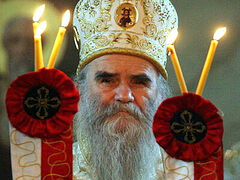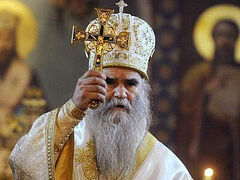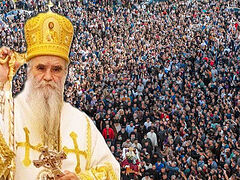December 8, 2020 is the fortieth day after the repose of Metropolitan Amfilohije (Radovic) of blessed memory.
The author and translator Svetlana Luganskaya shares her memories of His Eminence.
“Can I remain silent?”
 Vladyka Amfilohije and children. Photo by Svetlana Luganskaya At 8:22 a.m., October 30, the universe was orphaned and a new era, without Metropolitan Amfilohije, began. He had time to say to his cell-attendant, Hieromonk Justin, “It’s all over”, after which he received Communion in a semi-conscious state and soon fell asleep in the Lord.
Vladyka Amfilohije and children. Photo by Svetlana Luganskaya At 8:22 a.m., October 30, the universe was orphaned and a new era, without Metropolitan Amfilohije, began. He had time to say to his cell-attendant, Hieromonk Justin, “It’s all over”, after which he received Communion in a semi-conscious state and soon fell asleep in the Lord.
When you are speaking of a person of such a caliber as was Metropolitan Amfilohije of Montenegro and the Littoral, you especially feel the powerlessness of words, the inability to contain his Biblical personality in words.
He departed this world on the day of the glorification of his holy predecessors he had loved dearly: St. Peter of Cetinje and St. Peter (Petar) Njegos, a prince-bishop, a poet and “the visionary of Lovcen.” Vladyka combined the courage and fortitude of the former and the poetic and prophetic gifts of the latter. And now it is our duty to witness to his life and podvig.
According to his closest friend and companion, Bishop Atanasije (Jevtic):
“Amfilohije means a warrior on two fronts; he struggled for his nation, for its salvation, for its soul, for its physical existence and won in this war, while himself became a victim—his human body was worn out.”
“Like Moses he led his people out of slavery, brought them to freedom and commended his spirit to the Lord,” said Protopresbyter Gojko Perovic, rector of the Setinje Seminary, in his farewell speech.
He was often accused of meddling in politics and criticized for his harsh statements addressed to political figures. He responded to one of such accusations:
“I couldn’t do otherwise; I wrote four books on the renewed crucifixion of Kosovo. I have been to Kosovo many times and picked up severed heads with my own hands. My father brought me up on “The Mountain Wreath” [a poem and a play by St. Peter (Petar) II Njegos of Montenegro.—Auth.]; Kosovo has been in my blood since childhood. This is the summit of our life, of my life. And we suddenly saw the Serbian (and before them, the Montenegrin) authorities—of course, under pressure and violence that was unprecedented in history—renounce Kosovo. And these were the consequences of the 1999 bombings. History had never known this before: Nineteen armed countries, such a mighty armada, moved against a small nation, a small country—Kosovo and Metohija, Serbia and Montenegro. And that violence reached such a point that they secured the Montenegrin authorities’ renunciation of Kosovo and Metohija! The Church keeps the historical memory of Kosovo. What is Kosovo and Metohija if not the Church? And the people that has remained there is the Church. The Church is not me or Patriarch Irinej—we just perform special services in the Church. And as someone who belongs to this Church and this nation, can I remain silent? Can I suppress my cry?! I don’t meddle in politics and their choice, but as a keeper of the centuries-old tradition of the people I feel obliged to say, ‘Wait, who has authorized you to renounce something for which you have been elected to this post?!’”
 Kosovo. Metropolitan Amfilohije burying his spiritual children.
Kosovo. Metropolitan Amfilohije burying his spiritual children.
One who was filled with love and was a fearless warrior at the same time
According to a definition given by Bishop Atanasije (Jevtic): “The heart is synonymous with the personality.” He was entirely heart, a merciful and deep one.
There are a number of testimonies to this.
“I was listening to a course on the medieval history of the Balkans, constantly asking the teacher regarding some useful reading. Among a bundle of literature I came across some works by A. Rigo on the Bogomils who would hide on Mt. Athos and disguise themselves as hesychasts. Astounded by that information, I started digging deeper until I stumbled on an extract from the book by Metropolitan Amfilohije. And then hesychasm that had previously seemed to be an abstruse Byzantine system became not only much clearer but also much more attractive and useful to me…
“Several years later, my future husband was telling me about his studies in Bulgaria: ‘Vladyka Amfilohije visited us at the seminary on Forgiveness Sunday. We knew it and it was clear that he is an extremely busy man. But he found time for everybody—from seminarians to a cook from Gagauzia [an autonomous region in southeast Moldova.—Trans.] and blessed all of us. I still remember that meeting and keep the icon of St. Peter of Cetinje.’ And several years later I too met with Vladyka Amfilohije in person, and there was hardly anyone else in whose company I felt so good and at ease. And on that day, despite his very busy schedule, Vladyka visited some rooms of icons at the Tretyakov Gallery in Moscow. The curators of the rooms who were initially gazing at us with alertness as we were swiftly walking around the rooms and talking, in the next instant had their photos taken with Vladyka, asking for his blessing; and the hierarch again found some kind words and an icon of St. Peter of Cetinje for everybody… ‘Do come to us again!’ said the ladies who worked in different Gallery rooms at parting with Vladyka simultaneously” (Natalia Lukina, a historian and a specialist in Balkan studies).
“I was honored and privileged to be introduced to Metropolitan Amfilohije. A tiny room at Cetinje Monastery, filled with books on all four sides, was the metropolitan’s ‘residence’. I didn’t want to leave it. There was a sense of total serenity by his side. Small, almost weightless, he was filled with love and was a fearless warrior at the same time” (Vera Vodynsky, a film director).
Our time will be valued by the fact that we were contemporaries of this great man
My first personal meeting with Metropolitan Amfilohije took place in 1995 when he was virtually unknown in Russia. He was speaking in front of a small group of parishioners at St. Daniel’s Monastery in Moscow. He was saying words that were unfamiliar for Russians—about the embrace between God and man—they engraved themselves deeply into my heart. A few years later his book, The Fundamentals of Orthodox Upbringing, fell into my hands. I found answers to all the questions that then bothered me. In 2000, I travelled to Montenegro to show Vladyka the Russian text and receive his blessing for the publication of his book in Russia. From that time I became a permanent worker of the Metropolitanate of Montenegro and the Littoral, its radio and Svetigora (“The Holy Mountain”)—its official periodical.
 Vladyka Amfilohije (Radovic). Photo by Svetlana Luganskaya
Vladyka Amfilohije (Radovic). Photo by Svetlana Luganskaya
Whenever we met with Vladyka, he always had a new book in his hands that he wanted me to translate. I hardly ever troubled him with my personal matters and problems—to see this man was enough for me. But, learning from the monastery brethren about my miseries and illnesses, he would help and support me in incredible ways. He would call me “a handmaid of St. Peter (of Cetinje)” and wanted me to remain in Montenegro: “You are ours! How long are you going to travel to and fro?” he wondered every time. But I haven’t made up my mind to fulfil his desire.
It’s hard for me to talk about personal things; perhaps I need time to prevent the pain of bereavement from obscuring the memories. I know our time will largely be valued by the fact that we were contemporaries of this great man. And it is important what each one of us gained from communication with him, whether or not we have transformed our lives and ourselves, after having this example of genuine holiness before us.
If each one of us remembered what Christ Himself endured on Holy Friday…
Monk Pavle Kondic, Metropolitan Amfilohije’s constant companion, spoke about him at length:
“It is impossible to forget this gift of God, and erase it from your memory and heart. He was a bottomless vessel of the grace of God. God knows how many people who saw him for a minute, or two, for a year, or for decades like me, sensed this Divine grace, Divine love and truth that flowed from his every word and deed. This is Amfilohije. He was a champion of the truth of God, and that is why many a lance was broken over him and so many blows rained down on him. But as a true servant of God he had strength and God’s protection enabling him to endure all this up to this morning when God took his soul. This is how we will remember him—as a gift of God to the Serbian nation.
“The world stands by the prayers of the righteous, and you know this from the books of the Prophets Ezekiel and Isaiah; he beyond all doubt was one of the righteous men on whom the world stands. It is not me but his deeds that speak of this. A human being and a microcosm—he did not know a single day of rest. He burned with all his being: The zeal of Thine house hath eaten me up (Jn. 2:17). This is the way he lived. And I thank God that I could be with him from childhood—by some incomprehensive act of Divine providence our paths were inextricably interwoven from the time I was eleven. He accepted me just as a mother cat accepts a kitten—not its own but one it found in a garbage heap. It was me, an orphan without a father and a mother; and he accepted me, fed me, gave me to drink, watched over me, educated me, directed my steps quietly and unobtrusively, never saying the words ‘you must’, but only ‘well, look at what’s what.’ This is his respect for freedom as for the absolute and inviolable gift of God.
“I graduated from school, gymnasium and university, and one day I told him: ‘Vladyka, I am inclined to the monastic life.’ He answered, ‘Well, but first complete your studies, and then we will see.’ And on the second day of Christmas, 1994, I came to Cetinje Monastery and followed him from then on, was inspired by him and witnessed what Amfilohije was like… Amfilohije was not a theologian—he was not just a theologian with forty volumes of collected works, not just a professor, not just a father-confessor, not just a liturgical scholar—but Amfilohije was a servant of God in every atom of his being. Mercy, kindness, understanding and protection—he was a true servant of God always and everywhere. I was with him almost all the time when he visited hospitals and mental institutions, prisons, and when he was on the first front-line. The most terrible thing that could be was on the photographs that show his sacrifice in Kosovo, when we were picking up the burned and worm-eaten remains of our brothers and sisters who had suffered at the hands of Albanians. He did not waver. It can’t be seen on the photographs, but I was with him—he did not once tremble… Like a mountain wolf, he did not once think that he was likely to be hit by a projectile or they would do something terrible to him. This was Amfilohije.
 Next to Vladyka Amfilohije. Svetlana Luganskaya
Next to Vladyka Amfilohije. Svetlana Luganskaya
“Metropolitan Amfilohije can rightly be called a universal hierarch. From Australia to South Africa, North America, the European continent, Asia, and Russia’s vast expanses—he brought love and peace everywhere. It is impossible to enumerate how much, where, when and what he did, fulfilling the commandments of God. Without sparing himself, he would uproot the weeds of sin and corruption, heal the fuming wounds of war by the balm of prayer and brotherly love. But, on the other hand, he was neither a Mother Teresa nor an oily elder who says, ‘Fine, all will be fine.’ Rather, he was an unshakable mountain of truth; he would cut the chains of the lie, the demonic chains. This is why he was assaulted and badgered so much, not the least by the media, as you know. But all that streamed from him was volcanic energy and the power of Divine love. This was Amfilohije.
“And take hundreds of churches! They are his work, too. There is no place in Montenegro where his foot did not tread. I followed him, I am a witness, I am telling what I saw. He walked through the River Lim up to his neck in water, holding on to a rope, on December 4, the feast of the Entry of the Theotokos into the Temple, in order to celebrate the Liturgy for the first time after who knows how many centuries on the ruins of Sudikova Monastery, and then walked to see the remains of Urosevica Monastery. This was Amfilohije. And on the way, on a clearing, he would meet some children and stop to play football with them. It was his boundless and infinite Divine love and Divine peace.
 Metropolitan Amfilohije (Radovic) with Patriarch Pavle. Photo by Svetlana Luganskaya.
Metropolitan Amfilohije (Radovic) with Patriarch Pavle. Photo by Svetlana Luganskaya.
“I’ll give you another example. I don’t remember the year, but it was on Great and Holy Friday. I was still a young monk at Cetinje. I don’t remember why, but for some reason I needed to go out into the town to buy something. In the square I met an elderly couple. The woman who was old enough to be my mother came up and started spitting at me. I stood, as though thunderstruck—it lasted a few moments. Then I replied something rude to her, and her husband said, ‘Enough! Stop attacking a priest! Let’s go.’ Shocked, I came back to the monastery and confessed my sin to Vladyka. And the metropolitan ‘finished me off’ with his education, which was as hard as the cliffs of Moraca. He said: ‘She wasn’t spitting at you. The devil incited her, and she was assaulting Holy Friday, the [monastic] mantle—and you are not ready to endure this for Christ’s sake. What did Christ Himself endure on Holy Friday? And you can’t bear such trifles? You are unworthy of the mantle; take it off and go wherever you like.’ And this was Amfilohije.
“I don’t know what else I can say: it is impossible to express the personality, character and image of this man in words. He was boundless mercy and an incredible protective instinct—he would take into his care all who were slandered, defamed, stigmatized, had gotten into trouble and didn’t even turn to him. But Vladyka would learn about that, immediately call and help, protect, support and save. I was a witness of such cases an infinite number of times.”
The continuity
 Metropolitan Amfilohije (Radovic) with Bishop Joanikije
Metropolitan Amfilohije (Radovic) with Bishop Joanikije
At the end of his life, Metropolitan Amfilohije had time to see the fruit of his labors of thirty years—the resurrection of his beloved Montenegro, of its people “from a baby to an elder”, who unanimously stood up in defense of the churches and monasteries that the godless government of Milo Djukanovic had encroached upon. Cross processions in defense of the faith attracted tens of thousands of participants—not only Orthodox but also Catholics, Muslims, atheists—people with a living conscience. He has reconciled everybody, overcoming the “virus of fratricide.” Metropolitan Amfilohije was buried at the Church of the Resurrection of Christ. In accordance with his will, some earth from his native Moraca, the martyred Jasenovac, Kosovo and Metohija, was thrown into his grave.
Bishop Joanikije (Micovic) of Budimlja and Nikšić has been appointed the administrator of the Metropolitanate of Montenegro and the Littoral.
“Vladyka Joanikije is a spiritual child of Metropolitan Amfilohije; he is a bishop for whom people have the same love and esteem that they have for Amfilohije, who has out-and-out monastic qualities—a noble, open and people’s Vladyka,” said Archpriest Nikola Pejovic, cleric of the Church of the Resurrection of Christ.
He is also the only archpastor of the twenty-first century to date to be arrested and imprisoned for his staunchness in defense of the holy places of Montenegro.




